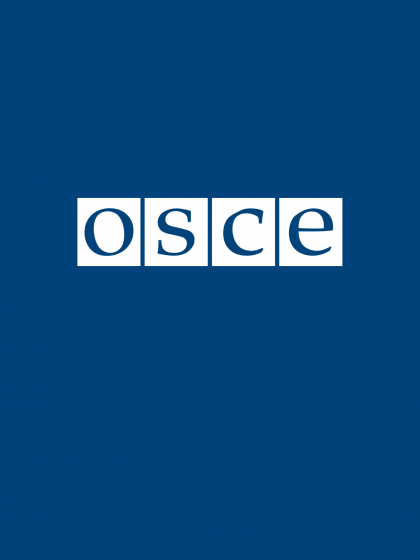Documents library
Comments on the Draft "Referendum Law on the State Status of the Republic of Montenegro"
Publishing date: 5 November 2001
Content type: Report
Where we are: OSCE Office for Democratic Institutions and Human Rights
What we do: Elections
Publisher: Organization for Security and Co-operation in Europe
The Office for Democratic Institutions and Human Rights (ODIHR) of the Organisation for Security and Co-operation in Europe (OSCE) has been requested by the Speaker of the Parliament to review and provide comments on the draft "Referendum Law on the State Status of the Republic of Montenegro" of 10 October 2001. The law is a lex specialis including 17 clauses, and is additional to the Referendum Law adopted on 19 February 2001, which was reviewed in detail by ODIHR in the Assessment published on 6 July 2001 (annexed herewith). Article 16 of the Draft Referendum Law on the State Status of the Republic of Montenegro specifically incorporates the provisions of the "Referendum Law (Official Gazette number 9/2001)" to apply "to the issues which are not regulated by this Law." This review should accordingly be read in conjunction with the Assessment of 6 July.
Statement by Ms.Karine Soudjian
Publishing date: 30 September 2008
Content type: Statement / speech
Where we are: OSCE Office for Democratic Institutions and Human Rights
Publisher: Organization for Security and Co-operation in Europe
Working Session 1: Rule of Law I, Human Dimension Implementation Meeting Warsaw, 29 September- 10 October 2008
Implementation of the Constitutional Law on the Rights of National Minorities (CLNM) and Related Legislation
Publishing date: 12 May 2003
Content type: Report
What we do: National minority issues
Publisher: Organization for Security and Co-operation in Europe
Report on the implementation of the Constitutional Law on the Rights of National Minorities (CLNM)
United Kingdom, General Election, 4 July 2024: Final Report
Publishing date: 12 June 2025
Content type: Report
Where we are: OSCE Office for Democratic Institutions and Human Rights
What we do: Elections
Publisher: Organization for Security and Co-operation in Europe
Statement by the Delegation of Ukraine in response to the report by the High Commissioner on National Minorities, Ambassador Christophe Kamp
Publishing date: 5 June 2025
Collections: 1523rd Plenary Meeting of the Permanent Council
Content type: Statement / speech
Where we are: Permanent Council
What we do: National minority issues
Publisher: Organization for Security and Co-operation in Europe
1523rd Plenary Meeting of the Permanent Council
Law on the Constitutional Court
Publishing date: 10 February 2000
Collections: Albanian laws and legal reviews
Content type: Legal document
Where we are: OSCE Presence in Albania
Publisher: Organization for Security and Co-operation in Europe
Law no. 8577, dated 10 February 2000, On the Organization and Functioning of the Constitutional Court of the Republic of Albania
The Law on Basis of Ownership and Proprietary Relations
Publishing date: 8 November 2001
Collections: Rule of Law/Human Rights translated laws
Content type: Legal document
Where we are: OSCE Mission to Serbia
What we do: Democratization
Publisher: Organization for Security and Co-operation in Europe
Translated law
Assessment of the Referendum Law in the Republic of Montenegro (FYR)
Publishing date: 6 July 2001
Collections: Election-related Legal Opinions and Comments
Content type: Report
Where we are: OSCE Office for Democratic Institutions and Human Rights
What we do: Elections
Publisher: Organization for Security and Co-operation in Europe
This assessment reviews and comments on the Law on Referendum, dated 19 February 2001, for conducting referendums in the Republic of Montenegro/Federal Republic of Yugoslavia. This assessment is based on unofficial English translations of the following: (1) the Referendum Law, consisting of forty-four (44) articles, (2) Law on the Election of Councillors and Representatives of the Republic of Montenegro (2000),2 (3) Law on Registers of Electors of the Republic of Montenegro (2000),3 (4) Citizenship Law of the Republic of Montenegro (1999),4 (5) Constitution of the Republic of Montenegro (1992), (6) Constitution of the Federal Republic of Yugoslavia (1992), and (7) Citizenship Law of the Federal Republic of Yugoslavia (published in the Official Gazette of the Federal Republic of Yugoslavia, No. 33/96). This assessment reviews and comments on the text of the Referendum Law only, and should not be construed as an endorsement or recommendation for a referendum in the Republic of Montenegro; nor should this assessment be construed as an endorsement or approval of any question that may be subsequently decided by a referendum.
OSCE ODIHR Analysis of the Draft Law of the Kyrgyz Republic "On Freedom of Religion and Religious Organizations"
Publishing date: 30 March 2001
Content type: Report
Where we are: OSCE Office for Democratic Institutions and Human Rights
What we do: Human rights
Publisher: Organization for Security and Co-operation in Europe
Decentralized but not Equal: Gender Disparities in Digital Finance across the South Caucasus and Moldova
Publishing date: 20 June 2025
Content type: Report
Publisher: Organization for Security and Co-operation in Europe
The advancement of gender equality is not only a matter of social justice, but also an economic imperative in the drive towards financial inclusion, financial literacy, and financial independence for women. While the technology and finance sectors have long grappled with gender disparities, the unique characteristics of blockchain and virtual assets present their own set of complexities. The gender gap in blockchain literacy and in the virtual assets sector is a multifaceted challenge that warrants close examination. This report focuses on the extent of the gender gap within the new technology realm and its implications in four OSCE participating States: Armenia, Azerbaijan, Georgia and Moldova. It provides a comprehensive analysis of the factors contributing to this divide and propose actionable strategies to bridge it. The analysis highlights the challenges and opportunities faced by women, such as the gender disparities in Web 3.0 education, understanding and skills, including ownership and utilization of cryptocurrencies and provides a series of recommendations which the OSCE and other organizations can take to address gender disparities in digital finance.





